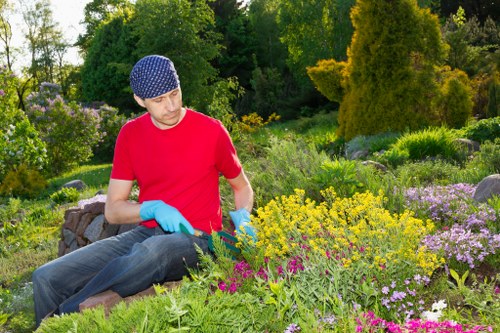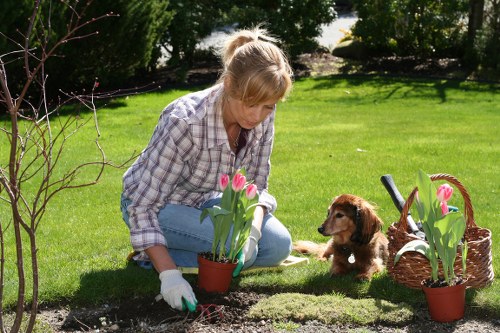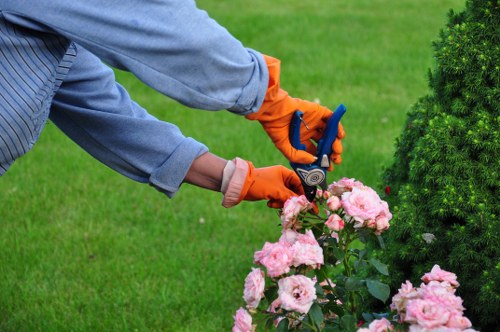Expert Garden Maintenance in Belmont: Keep Your Garden Thriving All Year Round
Introduction to Garden Maintenance

Maintaining a beautiful garden in Belmont requires dedication and knowledge. Whether you're a seasoned gardener or a beginner, understanding the basics of garden maintenance in Belmont can help your outdoor space flourish throughout the year.
Belmont's unique climate and soil conditions make it essential to tailor your gardening practices to local environmental factors. From selecting the right plants to implementing effective care routines, each step plays a significant role in achieving a vibrant garden.
In this comprehensive guide, we'll explore essential tips and strategies for garden maintenance in Belmont, ensuring your garden remains a stunning centerpiece of your home.
Planning Your Garden

A successful garden begins with meticulous planning. Start by assessing your garden's layout, considering factors such as sunlight exposure, soil type, and existing vegetation. Belmont's climate, which features warm summers and mild winters, allows for a diverse range of plants.
Choose plants that are well-suited to the local environment. Native plants not only thrive with minimal care but also support the local ecosystem by attracting pollinators and beneficial insects.
Creating a planting schedule helps you manage seasonal changes effectively. Organize your garden to include perennials, annuals, shrubs, and trees that complement each other and provide year-round interest.
Soil Preparation and Health

Healthy soil is the foundation of any thriving garden. Conduct a soil test to determine its pH level and nutrient content. Belmont's soil may vary from sandy to clay-based, impacting water retention and nutrient availability.
Amending your soil with organic matter, such as compost or aged manure, improves its structure and fertility. Regularly tilling the soil helps incorporate these amendments and promotes better root growth.
Implementing crop rotation and avoiding overuse of the same planting areas prevent soil depletion and reduce the risk of pests and diseases taking hold.
Watering Strategies

Effective watering is crucial for garden health, especially during Belmont's hot summers. Install a drip irrigation system to deliver water directly to plant roots, minimizing evaporation and water waste.
Water your garden in the early morning or late evening to reduce evaporation and ensure plants receive adequate moisture. Mulching around plants helps retain soil moisture and regulate temperature.
Monitor soil moisture levels regularly and adjust your watering schedule based on weather conditions. Overwatering can be just as harmful as underwatering, leading to root rot and other issues.
Pruning and Trimming Techniques

Regular pruning promotes healthy growth and maintains the desired shape of your plants. Identify dead or diseased branches and remove them promptly to prevent the spread of infections.
Learn the appropriate pruning techniques for different plant types. For instance, fruit trees in Belmont benefit from annual pruning to enhance fruit production and airflow.
Trimming shrubs and hedges keeps them looking neat and encourages dense growth. Use sharp, clean tools to make precise cuts and reduce stress on the plants.
Pest and Disease Management
Preventing and managing pests and diseases is a key aspect of garden maintenance in Belmont. Regularly inspect your plants for signs of infestations or infections, such as discolored leaves or unusual growth patterns.
Implement integrated pest management (IPM) practices by encouraging natural predators, like ladybugs and birds, to control pest populations. Use organic or chemical treatments only when necessary, following recommended guidelines.
Maintaining garden cleanliness, such as removing fallen leaves and debris, reduces habitats for pests and minimizes disease spread.
Seasonal Maintenance Tasks

- Spring: Prepare beds, plant new specimens, and fertilize.
- Summer: Focus on watering, weeding, and pest control.
- Autumn: Mulch, prune, and prepare for winter.
- Winter: Protect plants, plan for the next year, and perform tool maintenance.
Adapting your maintenance routines to the changing seasons ensures your garden remains resilient and beautiful throughout the year.
Choosing the Right Tools and Equipment

Investing in quality gardening tools can make garden maintenance in Belmont more efficient and enjoyable. Essential tools include pruners, trowels, shovels, and a reliable watering system.
Consider ergonomically designed tools to reduce strain during long maintenance sessions. Regularly clean and sharpen your tools to maintain their effectiveness and extend their lifespan.
Organize your tools in a dedicated storage area to keep your garden space tidy and ensure tools are readily accessible when needed.
Lawn Care and Maintenance

A well-maintained lawn enhances the overall appearance of your garden. Mow your lawn regularly, ensuring you don’t cut the grass too short, which can stress the grass and promote weed growth.
Fertilize your lawn according to a schedule that suits Belmont's climate. Overseeding during the growing season helps maintain a dense and healthy turf.
Address any signs of lawn disease promptly by improving drainage, aerating the soil, and applying appropriate treatments.
Mulching for Garden Health

Mulching provides numerous benefits for your garden, including moisture retention, temperature regulation, and weed suppression. Apply a layer of organic mulch around plants to enrich the soil as it decomposes.
Regularly replenish mulch to maintain its effectiveness and aesthetic appeal. Choose mulching materials that complement your garden's design and plant types.
Proper mulching techniques prevent mulch from touching the plant stems directly, reducing the risk of rot and pest infestations.
Composting and Soil Enrichment

Composting transforms kitchen scraps and garden waste into nutrient-rich compost, enhancing soil fertility for garden maintenance in Belmont.
Set up a compost bin in a convenient location and balance green and brown materials to facilitate decomposition. Regularly turn the compost to aerate it and speed up the process.
Incorporate finished compost into your garden beds to improve soil structure and provide essential nutrients to your plants.
Creating Sustainable Garden Practices

Embrace sustainable practices to make your garden eco-friendly. Use water-efficient irrigation systems to conserve water and reduce runoff.
Choose native and drought-tolerant plants to minimize water usage and support local wildlife. Implementing rain gardens can help manage stormwater and promote biodiversity.
Reduce chemical usage by opting for natural fertilizers and pest control methods, fostering a healthier environment for both plants and beneficial insects.
Conclusion

Maintaining a garden in Belmont requires a combination of planning, consistent care, and sustainable practices. By following these expert tips, you can enjoy a vibrant and healthy garden that enhances your home's beauty and provides a welcoming outdoor space for family and friends.
Ready to elevate your garden? Contact us today for professional garden maintenance services tailored to your needs.